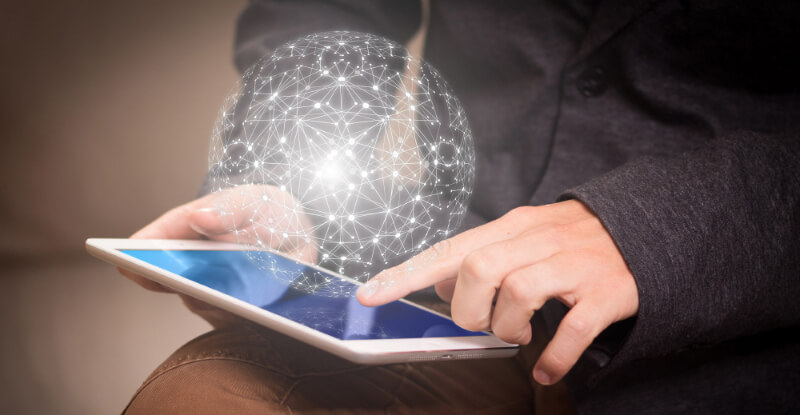The Future of Cloud Computing and Cloud Services2021.02.17
Cloud computing is the delivery of computing services (including servers, storage, databases, networks, software, analysis and intelligence)-over the Internet to offer fast innovation, flexible resources and economies of scale. For cloud services, you typically pay only for cloud services you use, helping you lower your operating costs, run your infrastructure more efficiently, and scale as your business needs change. Cloud computing has seven advantages as low cost (pay on demand), fast deployment and high efficiency (buy as needed), good scale (flexible expansion at any time on demand), and high performance (purchase required computing power on demand, without performance bottlenecks), high reliability (ensure business continuity), high security (professional security protection), making cloud computing and cloud services have become the current standard configuration of all Internet services and the first choice for enterprise production and operation. As far as email services are concerned, according to incomplete statistics, 86% of the global top 500 companies have migrated their own email services to cloud email services, while 100% of small and medium-sized enterprises and individuals use cloud email services.
The advantages of cloud services are recognized, but cloud computing and big data have brought about a problem of data security and privacy protection. As far as email services are concerned, emails contain a large amount of personal privacy information, and business confidential information. In addition to the security risks of cleartext transmission, these information also face a possible leakage of confidential information stored in the cloud in cleartext. In the era of self-management of mail servers, mail servers are generally located in the company’s intranet, the network access controls, and security controls can ensure the security of email content stored on the mail server, but now the email content is stored in the cloud. Although the cloud email service provider has very complete security control, but it is no longer under the user's own control. How to ensure that the email content will not be illegally stolen and illegally leaked is also an urgent problem to be solved.
In other words, people need cloud services, but in order to protect user privacy and business secrets, people cannot just rely on cloud services. People need some key data to be stored locally on their computers, and some key data operations are done locally on their computers. Only in this way can we effectively use the powerful cloud computing capabilities and cloud services to achieve previously impossible functions, and can we use client software to complete key operations and key data management locally. This is the most perfect solution-"Cloud-Client integration, collaborative work", this is the integrated application of cloud services and client software, and the future development direction of cloud computing and cloud service.
MeSign Technology is committed to the use of PKI technology to realize the encryption and digital signature of Internet information, so as to ensure the confidentiality of data, the authenticity of the identity of data producers and users, the integrity of data, the non-repudiation of data production and use behavior. This requires a strong computing power and a set of systems to complete, and it cannot be achieved with a single client software, which means that it requires cloud computing and cloud services. Therefore, MeSign Technology has built a cloud cryptographic infrastructure to empower the developed client software to complete tasks that cannot be done by a single client software.

MeSign App, an encrypted email client software developed by MeSign Technology, is based on cloud cryptographic infrastructure, cloud - client integration, so that users can easily turn insecure cleartext email services into encrypted email services and make the complicated email encryption and digital signature be completely fully automated, and the zero threshold and complete insensitivity, and make the complex PKI encryption technology truly popularized and applied! Users do not need to learn and train what is an email certificate, nor do they need to apply for an email certificate from CA, and learnt to deploy and use the email certificates, our solutions realize certificates automatic application and automatic deployment, so that users only need to focus on using the client software to serve their business.
MeSignDoc App, an e-signature tool software developed by MeSign Technology, is based on cloud cryptographic infrastructure, cloud - client integration, so that users do not need to upload documents to be signed to the cloud, truly protect user privacy, and make the complicated document digital signature and encryption be completely fully automated, and the zero threshold and complete insensitivity, and make the complex PKI encryption technology truly popularized and applied! Users do not need to learn and train what is a document signing certificate, nor do they need to apply for a document signing certificate from CA, and learnt to deploy and use the signing certificate, our solutions realize certificate automatic application and automatic deployment, so that users only need to focus on using the client software to serve their business.
In other words, the reason why MeSign Technology can realize fully automatic email encryption and document signing is that it requires not only a powerful cloud computing service, but also a client software landing. Cloud computing alone is not enough, cloud computing alone cannot truly guarantee the security of user data in the cloud. A client must manage its own key data on the user device and realize the encryption of the key data before going to the cloud. This is the future of cloud computing and cloud services, and MeSign Technology is ahead.